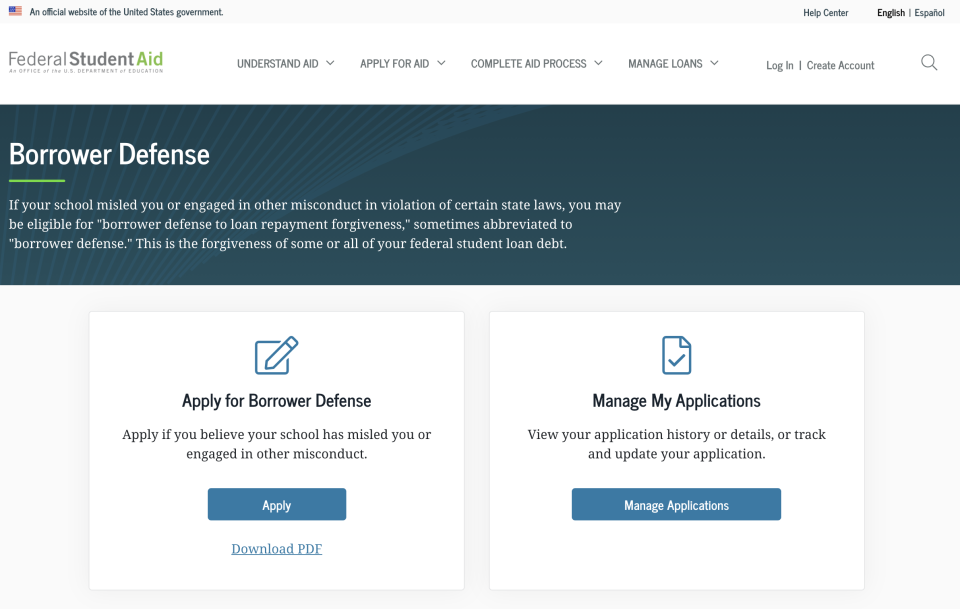Education Department unveils new loan forgiveness website, expert calls it 'a distraction'
The Education Department (ED) has created a new website for borrowers who are seeking debt relief after being defrauded by a college.
But one expert involved in litigating these borrower defense claims said the changes were mostly cosmetic.
“Throughout this administration, what we've seen is the substitution of process for substance,” Toby Merrill, director of the Project on Predatory Student Lending at Harvard Law School, told Yahoo Finance.
“None of the actions that the department has undertaken has been providing relief to borrowers,” she added, “and that's the only thing that they need. I think this is a distraction — this is purposeful distraction.”
Clare McCann, deputy director at New America, a federal policy think tank, said that while it “seems a little clunky, and it's unfortunate it took this long, a single consolidated website with an online application is going to be hugely helpful to borrowers.”
The new website attempts to improve the borrower defense process, which involves former students of allegedly predatory schools seeking loan forgiveness.
‘Our borrower defense mechanism doesn't work at all’
There are a few obvious limitations with the newly unveiled process. For instance, the website says that only those with Direct Loans can get debt relief.
“If some of your federal student loans are Federal Family Education Loan (FFEL) Program loans and/or Federal Perkins Loan Program loans, they are not eligible for discharge under the Borrower Defense to Repayment law or regulations,” the website states.
About 8 million borrowers holding commercially-held, federally-backed Federal Family Education Loans (FFEL) and Perkins loans are effectively excluded from this process.
Another limitation is if a borrower has defaulted on their federal loans that are in collections, the website states that a borrower defense application triggers a halt on collections.

The site also estimates how much interest an applicant would incur while in forbearance — as well as the total they’d owe if their application ends up being denied — which could discourage borrowers from applying for the process in the first place.
Overall, Merrill stressed, the website doesn’t address the root of the problem.
“Right now our borrower defense mechanism doesn't work at all, so I still think people should have started there,” she said. “It's hardly the form of the application that is like the source of my concern.”
‘I know this is disappointing’
Borrower defense rules were originally written into law through the Higher Education Act in the early 1990s and were meant to help victims of fraudulent schools seek relief.
Under existing law, borrowers with federal loans are eligible for loan forgiveness if a college or a university has misled them or engaged in other misconduct in violation of certain state laws.
After the Great Recession, enrollment at for-profit schools “skyrocketed in the first decade of the period, nearly quadrupling between 2000 and 2011,” according to the New York Fed.
The Obama administration instituted regulations protecting defrauded borrowers, and the Trump administration attempted to dismantle those regulations despite court rulings favoring borrowers.

The new website offers the same tool that the department had paused a few months back, which led an investigation by the House Education Committee.
A whistleblower complaint, discovered by U.S. News reporter in June, found a that alleged that the principal deputy undersecretary at the FSA had pushed back on changes that made the site more user-friendly.
In October, the education committee revealed documents in which they said showed how that played out.
“I know this is disappointing,” an FSA official wrote in an email, “as many of us have done a lot of work to get to this point.”
This post has been updated to remove a quote from an anonymous Congressional staffer.
—
Aarthi is a reporter for Yahoo Finance. She can be reached at [email protected]. Follow her on Twitter @aarthiswami.
Read more:
Trump v. Biden: Here's what's at stake for student loan borrowers
'Just not right': Defrauded for-profit college students suffer rejected relief claims
Read the latest financial and business news from Yahoo Finance
Follow Yahoo Finance on Twitter, Facebook, Instagram, Flipboard, SmartNews, LinkedIn, YouTube, and reddit.

